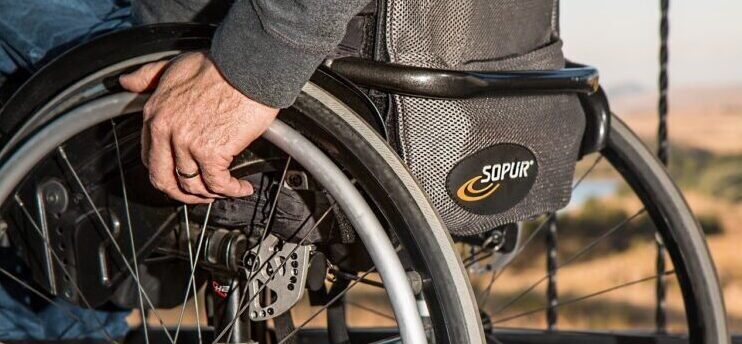Free Transportation Services. It can be a real problem when people with disabilities cannot move around effectively. That is why it is good to know that in the United States, those with disabilities can receive access to free mobility services. These free transportation programs and services help those who need excellent mobility.
TABLE OF CONTENTS
The Great Need for Transportation
Statistics show that every year around 600,000 older adults can no longer drive. That makes it hard for older adults to shop for what they need, get to the doctor for their appointments or even attend social events.
Such instances increase the isolation, negatively affecting their well-being and health. Transportation is a big issue for family caregivers. According to the National Aging and Disability Transportation Center (NADTC) survey, over 40 percent of caregivers spend additional time arranging or providing transportation for persons with a disability or older people.
This guide looks at the free transportation services for those with challenges accessing safe transportation. These services are made possible by government programs, charities, or eldercare locator service churches.
The Cost and Payment of Mobility Services
Travel option costs for senior individuals vary. Special transportation service (Public Para-Transit Services) for older adults and those with a disability almost twice the cost of public transportation covering the same distance and route. Other Volunteer Driver Programs could charge up to ten dollars, while others charge nothing to individuals with a disability.
You can also opt to use private services, but they charge as much as twenty to forty dollars for every trip made. Medicare pays for medically needed transportation services that occur suddenly, such as the use of an ambulance. Medicare will not cover non-emergency or non-medical transportation even if the persons with a disability or older adults attend a medical appointment.
Free Transportation for Persons with a Disability or Older Adults
Medicaid offers transportation assistance for older people with disabilities. Remember that Medicaid is not one program but a collection of different resourceful programs. These programs’ benefits differ in other states. Some programs via Home and Community Based Services Waivers offer to fund transportation. The transportation programs do not require that ride is for physical therapy or medical appointments.
Medicaid also helps persons with a disability or older adults by paying a Personal Care Attendant to take care of them. These assistants will accompany the individual on Para-Transit services. Typical Medicaid also covers medical and non-emergency transportation.
Who is Eligible for Free Transportation?
Assisted transportation eligibility requirements will depend on the type of transportation service. One of the standard eligibility requirements is one’s disability level. There are private rides that might not be able to accommodate the individuals that cannot move without the help of a wheelchair.
Other services offered by Medicaid could require a designation “disabled” emblem from the Social Security Administration to provide transportation assistance. In such a case, older individuals that have challenges due to aging do not qualify for this assistance.
Some programs only offer rides for medical appointments that are non-emergency. Some programs have no requirements which allow those with disabilities to use the service for errands and shopping. Also, you must have registered first for most private rides before scheduling rides with them.
Free Rides & Transportation Services
1. Private Ride Services
These services are also known as Door-to-Door, Door-Through-Door, or D2D services. They are private companies that cater for the transportation assistance of older adults or individuals with a disability at a fee. These are not regular taxi services since they specialize in those with disabilities and older persons.
They provide assistance from your residence to the vehicle, help you get in and out of the car, and alight from the vehicle. Aid is also in loading the wheelchair, carrying bags, and even purchases when you go out shopping. Some vehicles in the private ride service have equipment that supports motorized wheelchairs. However, this will come at an extra fee. The rides are limited to suburban and urban areas, unfortunately.
2. Volunteer Driver Programs
As the name suggests, these are programs whereby some volunteers assist individuals with disabilities and older adults by offering them door-to-door transportation. They are independent and regional programs. It is difficult to generalize these volunteer services since they are different in diverse regions. Also, note that these services are not readily available in all areas. Some areas do not have these volunteer driver programs.
Riders must register with these volunteer services for you to get a ride. Once registered, remember that you need to schedule your rides a day or two in advance. Typically, these rides will not dictate the reasons to qualify for a ride. You can schedule rides for social outings, shopping, or medical appointments.
3. Para-Transit Services
ADA (Americans With Disabilities Act) has it that there must be a unique system that accommodates the older people and those with disabilities in every city with public transportation. These are the systems commonly known as Para-Transit Services. Typically, these vans utilize wheelchair-accessible vans in the place of buses.
This service is curb-to-curb, meaning that the passenger should be able to get to the pick-up point on their own or with help from their caregiver. The driver will only take them to the drop-off point; from there, the rider is on their own. The person with a disability can come along with a person who will help them get to the pick-up point and also help them get to their destination after being dropped off.
The Pros and Cons
However, there are pros and cons to these services. The service is inexpensive as the law allows them to charge only twice the public transportation. If the public transport from point A to point B is $5, the para-transit service will only charge a maximum of $10. However, you must register to use this service effectively.
To qualify for this service is determined by the inability of the person with a disability or older person to use the public transport system effectively. Pick-up times and services can be pretty flexible.
Independent Transportation Network America
It is a non-profit organization that provides mobility services for the senior, especially individuals aged 60 years and above. The visually impaired also qualify for this service. You can purchase annual membership of about $50 to $60 for one rider and $60 to $80 for a family with this service.
Independent Transportation Network has both volunteer and paid drivers assigned to riders. The rides are always available, and there are no limitations to whatever needs you may require to use the vehicle.
Here the drivers offer assistance with bags and door-to-door services. They will also provide limited assistance with getting out and in the vehicle. You will not worry about cash transactions with this service since the expenses are paid from the “personal transportation account.”
Usually, the costs for every ride will be half the costs of taking a taxi. Save some money by booking this service in advance and sharing rides.
ITN has several affiliate organizations throughout the United States.
1. Free Transportation for Disabled Veterans
There are many disabled veterans in the country. Usually, these people will have a problem with transportation since they cannot move about due to their condition. Most governments have veterans transportation programs that help veterans attend medical appointments and other errands. These programs are ideal for veterans’ travel solutions seeking VA health care facilities.
2. Veterans Free Transportation Program
It is a governmental program that helps veterans get to health care facilities. These services are offered at no cost or nominal prices, if any. Here are some of the benefits you can expect with this program:
- Veterans Transportation Service
- Beneficiary Travel
- Highly Rural Transportation Grants
3. Veterans Transportation Service
It is a service that offers reliable and safe transportation for disabled veterans to authorized non-VA medical appointments and health care facilities. This program will also partner with other service providers in the community to meet the transportation needs of disabled veterans. Partners may include:
National and local non-profit groups
- Veteran service organizations
- State, federal, and local transportation services
- Beneficiary Travel
With this program, eligible disabled veterans will receive reimbursements for the travel costs incurred in visiting the VA health care facilities. This program could also offer pre-approved transportation options for the veterans and even organize unique modes of transportation for the VA. Here veterans are eligible for common means of transportation such as trains, taxis, or buses.
Highly Rural Transportation Grants
HRTG offers grants to State Veteran Service Agencies and Veteran Service Organizations. Grantees of these services provide transportation solutions for veterans looking for Non-VA and VA-approved care in rural areas.
You can also take advantage of the charities and other eldercare locator service churches to receive free transportation services as a senior person or an individual with a disaility. (find out more about Rural Transportation Grants)










